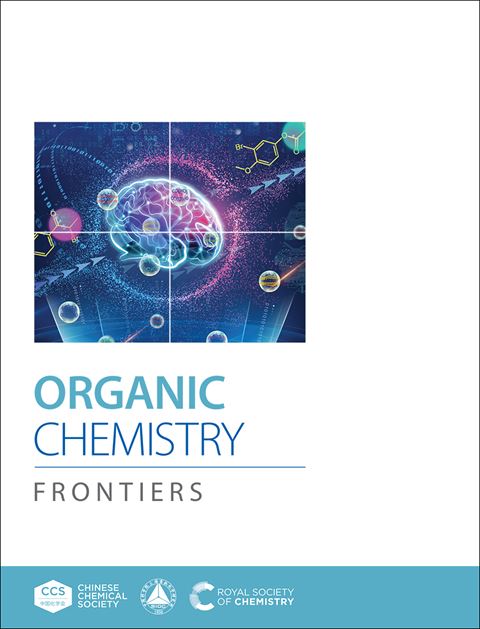Transition Metal-Free Transfer Hydrogenation of Aryl Azides with Alcohols: Direct Synthesis of Secondary Amines and N-Heterocycles
IF 4.7
1区 化学
Q1 CHEMISTRY, ORGANIC
引用次数: 0
Abstract
Organic azides and alcohols were harnessed in a transition metal-free, base-mediated transfer hydrogenation system, which offers an efficient synthetic route to secondary amines. In the presence of KO t Bu, aryl azides underwent hydrogen transfer with alcohols to produce secondary amines in high yields. The method features a broad substrate scope, gram-scale applicability, and straightforward experimental setup. Furthermore, N-heterocycles such as quinoxalines and quinolines were synthesized under similar reaction conditions. Mechanistic studies demonstrated that both alcohols and KO t Bu were essential for facilitating hydrogen transfer to azides. The exclusion of a radical pathway, confirmation of alcohol as the reductant, and deuterium labeling experiments provided key insights into the reaction mechanism. DFT calculations revealed that the reduction of azides proceeded through a six-membered cyclic transition state, resembling the mechanism proposed for the Meerwein-Ponndorf-Verley (MPV) reduction. Notably, the potassium cation stabilized the transition state by interacting with both the aryl group and the nitrogen atom of the aryl azide.芳基叠氮化物与醇的无过渡金属转移加氢:仲胺和n -杂环的直接合成
有机叠氮化物和醇在无过渡金属、碱介导的转移加氢体系中被利用,这为合成仲胺提供了一种有效的途径。在KO - t - Bu存在下,芳基叠氮化物与醇发生氢转移,高产出仲胺。该方法具有广泛的衬底范围,克级适用性和简单的实验设置。此外,在相似的反应条件下合成了n -杂环化合物,如喹诺啉类和喹啉类。机理研究表明,醇和KO - t - Bu都是促进氢向叠氮化物转移所必需的。排除自由基途径,确认醇作为还原剂,以及氘标记实验提供了对反应机制的关键见解。DFT计算表明叠氮化物的还原是通过六元循环过渡态进行的,类似于Meerwein-Ponndorf-Verley (MPV)还原的机制。值得注意的是,钾阳离子通过与芳基和芳基叠氮化物的氮原子相互作用来稳定过渡态。
本文章由计算机程序翻译,如有差异,请以英文原文为准。
求助全文
约1分钟内获得全文
求助全文
来源期刊

Organic Chemistry Frontiers
CHEMISTRY, ORGANIC-
CiteScore
7.90
自引率
11.10%
发文量
686
审稿时长
1 months
期刊介绍:
Organic Chemistry Frontiers is an esteemed journal that publishes high-quality research across the field of organic chemistry. It places a significant emphasis on studies that contribute substantially to the field by introducing new or significantly improved protocols and methodologies. The journal covers a wide array of topics which include, but are not limited to, organic synthesis, the development of synthetic methodologies, catalysis, natural products, functional organic materials, supramolecular and macromolecular chemistry, as well as physical and computational organic chemistry.
 求助内容:
求助内容: 应助结果提醒方式:
应助结果提醒方式:


